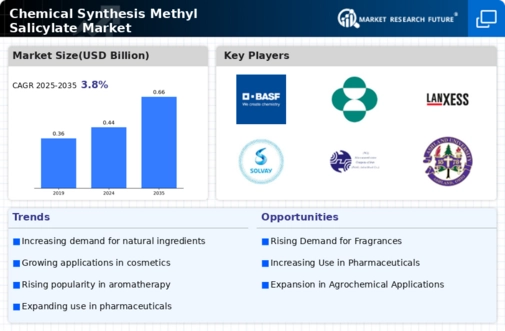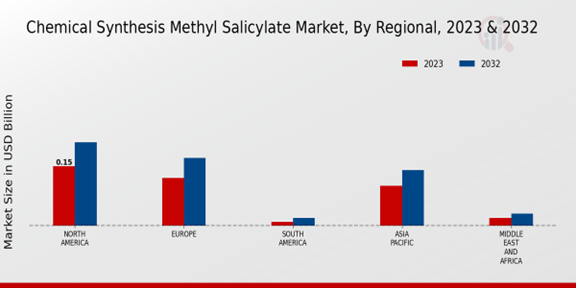Market Growth Projections
The Global Chemical Synthesis Methyl Salicylate Market Industry is projected to experience substantial growth over the coming years. With a market value of 0.44 USD Billion in 2024, it is anticipated to reach 0.66 USD Billion by 2035. This growth trajectory suggests a compound annual growth rate (CAGR) of 3.82% from 2025 to 2035. The increasing applications of methyl salicylate across various sectors, including personal care, pharmaceuticals, and food, contribute to this optimistic outlook. As industries continue to recognize the benefits of this compound, the market is likely to expand, reflecting broader trends towards natural and effective ingredients.
Expansion in Pharmaceutical Applications
The Global Chemical Synthesis Methyl Salicylate Market Industry is poised for growth due to its essential role in pharmaceutical formulations. Methyl salicylate is utilized for its analgesic and anti-inflammatory properties, making it a key ingredient in topical pain relief products. The increasing prevalence of chronic pain conditions globally necessitates the development of effective treatments, thereby boosting the demand for methyl salicylate. As the market evolves, it is anticipated that by 2035, the industry will reach 0.66 USD Billion, driven by innovations in drug formulations that incorporate this compound. This trend indicates a robust future for methyl salicylate in the pharmaceutical sector.
Growing Demand in Personal Care Products
The Global Chemical Synthesis Methyl Salicylate Market Industry experiences a notable increase in demand due to its widespread application in personal care products. Methyl salicylate serves as a fragrance and flavoring agent, enhancing the sensory appeal of cosmetics and toiletries. The rising consumer preference for natural and organic ingredients further drives this trend, as methyl salicylate is derived from natural sources. In 2024, the market is projected to reach 0.44 USD Billion, reflecting the growing inclination towards products that incorporate this compound. As consumers become more conscious of product ingredients, the demand for methyl salicylate in personal care is likely to expand significantly.
Regulatory Support for Natural Chemicals
The Global Chemical Synthesis Methyl Salicylate Market Industry is positively impacted by regulatory support for natural chemicals. Governments worldwide are increasingly promoting the use of natural ingredients in various applications, including cosmetics, food, and pharmaceuticals. This regulatory environment encourages manufacturers to incorporate methyl salicylate into their products, as it is recognized for its safety and efficacy. The alignment of regulatory frameworks with consumer preferences for natural products is likely to bolster the market's growth. As regulations evolve to favor natural chemicals, the demand for methyl salicylate is expected to rise, further solidifying its position in the global market.
Rising Interest in Natural Flavoring Agents
The Global Chemical Synthesis Methyl Salicylate Market Industry benefits from the growing trend towards natural flavoring agents in the food and beverage sector. Methyl salicylate is recognized for its distinctive flavor profile, which is increasingly favored by consumers seeking authentic and natural tastes. This shift is particularly evident in the production of confectionery and beverages, where methyl salicylate is employed to enhance flavor. As the market adapts to these consumer preferences, the compound's application is expected to expand, contributing to a projected CAGR of 3.82% from 2025 to 2035. This growth reflects the industry's response to the demand for natural ingredients.
Technological Advancements in Synthesis Processes
The Global Chemical Synthesis Methyl Salicylate Market Industry is influenced by ongoing technological advancements in chemical synthesis processes. Innovations in production techniques enhance efficiency and reduce costs, making methyl salicylate more accessible to various industries. These advancements not only improve yield but also minimize environmental impact, aligning with global sustainability goals. As a result, manufacturers are likely to adopt these new technologies, thereby increasing the overall production capacity of methyl salicylate. This trend is expected to support the market's growth trajectory, as companies seek to optimize their operations and meet the rising demand for this compound.



















